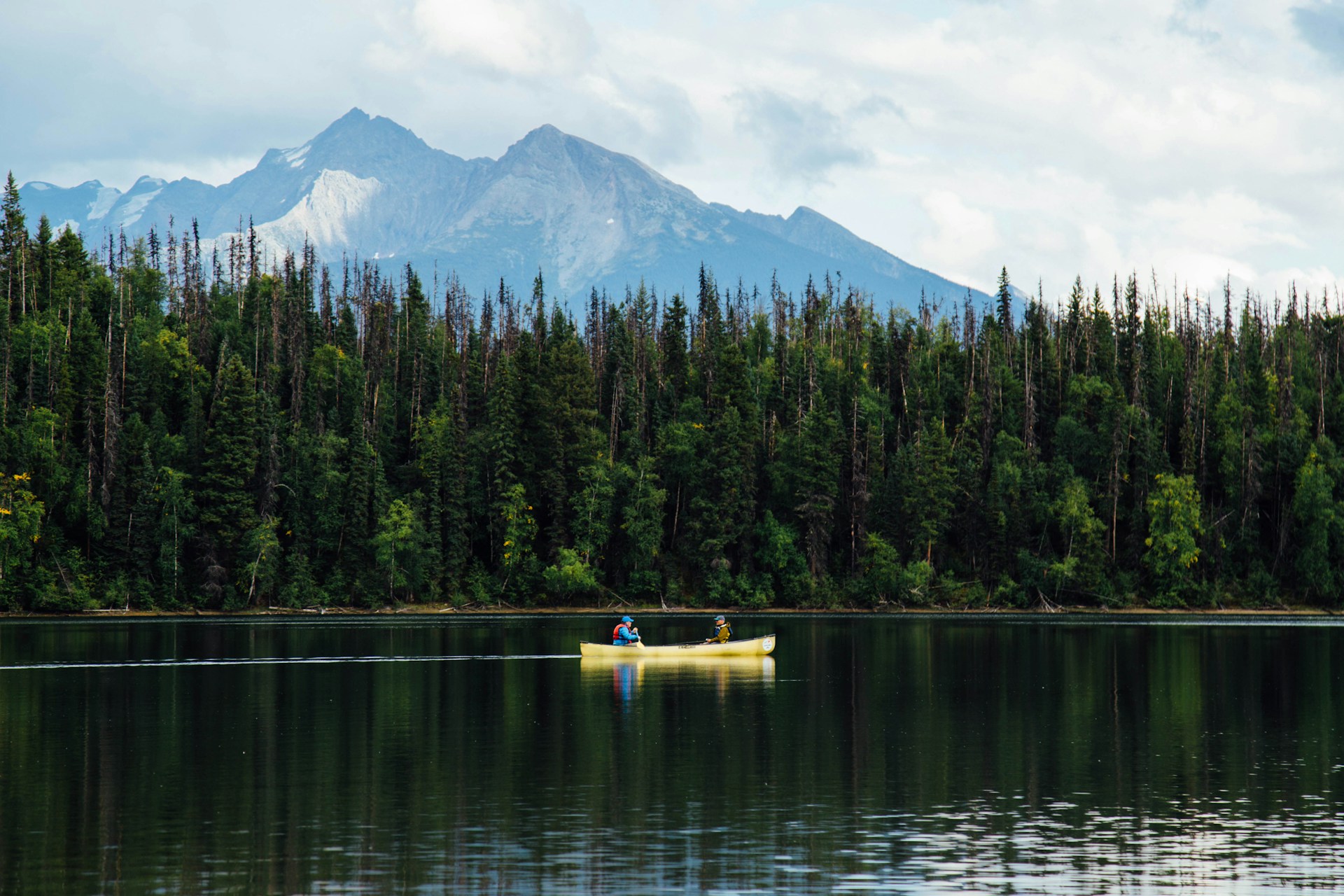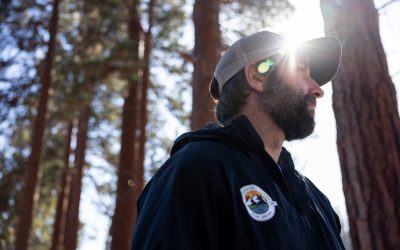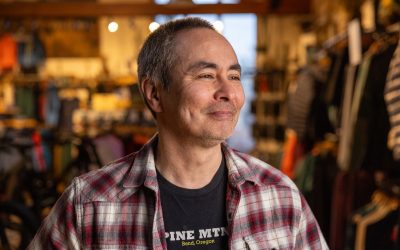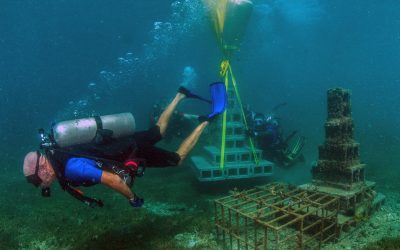“I can share the history without laying guilt, shame, or blame, and I can turn it around and use it in the work towards my own healing, and that is effective.” – Mike Retasket
Can travel and tourism help shine a light on Canada’s darkest histories? As investment in Indigenous tourism in Canada rises, so are the opportunities for truthtelling and cultural exchange. That exchange includes stories that give visitors an honest look at the history of colonization and the ways its impacts continue to harm Indigenous communities.
It’s a delicate art form to make painful stories part of a meaningful tourism experience. But as we’ll hear from today’s guest, some Indigenous tourism operators are finding opportunities for connection – and even healing – through telling truths that have typically been ignored or suppressed.
Mike Retasket has served five terms as Chief of the Bonaparte First Nation, and he’s a prolific community leader in the Cariboo Chilcotin Coast region of British Columbia. He’s currently on the board of directors at Cariboo Chilcotin Coast Tourism Association and the Tourism Industry Association of BC. Mike tells us about his method for sharing the dark aspects of colonial history alongside his community’s rich cultural gifts. And in a memorable twist, he also shares his surprising and unlikely path into tourism through the 2010 Olympic Games in Vancouver.
In this episode, you’ll learn:
- About Mike’s journey from Olympic Games protestor to master trainer of the next generation of Indigenous tourism leaders.
- How tourism connects with the United Nations Declaration on the Rights of Indigenous People, the work of the Truth and Reconciliation Commission, and Aboriginal title.
- How he shares difficult histories of Indigenous people in British Columbia in a way that connects with visitors.
- Mike’s overarching formula for budgeting in an organization.
This episode is the first in a set of stories from the Cariboo Chilcotin Coast region of British Columbia, Canada – a large, rural area of the province’s interior spanning mountains, rivers, lakes, plains, and an ocean coastline. Here, residents are behind some inspiring and perhaps lesser-known travel industry innovations. The region is taking steps to become a leader in sustainable travel. Locals are banding together to adapt to increased climate threats like wildfires. And leaders from many First Nations are finding ways for tourism to help tell their stories that show Indigenous values of care for the lands and waters while telling the truth about colonization. These communities have accomplished a lot that others can learn from. The stories that unfold will challenge your perspective and point to solutions that can make sure that travel and tourism benefit everyone.
Subscribe to Travel Beyond through Apple Podcasts, Spotify, or your favourite podcast player.
Show notes
Bonaparte First Nation – A member band of the Shuswap Nation Tribal Council of the Secwepemc (Shuswap) people, located in what is now known as interior British Columbia.
Cariboo Chilcotin Coast Tourism Association – The region’s destination management organization.
Indigenous Tourism BC – “a non-profit, membership-based organization that is committed to growing and promoting a sustainable, culturally rich Indigenous tourism industry.”
Tourism Industry Association of British Columbia – A not-for-profit tourism advocacy group representing members across the province.
Episode transcript
Mike Retasket: There is a real hunger by the younger people to learn some of the truths in a very sad history. What I’ve learned about the sad history is, when I share the history, to share it in a way that doesn’t lay guilt, shame, or blame. It is so much more effective. And then I’ve taken it one step farther. I can share the history without laying guilt, shame, or blame, and I can turn it around and use it in the work towards my own healing. And that is effective.
David Archer: Hello and welcome back to Travel Beyond, where we partner with leading destinations to bring you inspiring solutions to the greatest challenges facing communities and the planet. I’m David Archer from Destination Think, and I’m recording from Daajing Giids, British Columbia, which is a village in Haida Gwaii, B.C., the territory of the Haida Nation.
On this show, we look at the role of travel and we highlight destinations that are global leaders. We talk to the changemakers who are addressing regenerative travel through action in their communities, and often from the bottom up. And we’re actively looking for the best examples of efforts to regenerate economies, communities, and ecosystems. So please be sure to reach out if you have a story to share with us.
Last episode, we heard from Trent Yeo of Ziptrek Ecotours about building a zero carbon tourism business. And we’ve got lots more from Queenstown Lakes.
But before we carry on with those stories, we’re going to take a slight detour all the way back to North America to visit a region of British Columbia, Canada, where there are some incredible and lesser known travel industry stories happening. It’s a place where, in many ways, sustainability is already baked into local living due in part to the influence of local Indigenous leadership.
And I’m talking about the Cariboo Chilcotin Coast region of BC. It’s a large area located roughly between the cities of Prince George in the north and Kamloops in the south, and from the Rocky Mountains in the east to the Pacific Coast in the west. It’s a rural region, and by some standards fairly remote, and that means people have had to shape their way of life in harmony with the land.
And we’re here because the region wants to lead sustainable travel efforts as it adapts to some pretty dramatic climate impacts, like wildfires in recent years. This destination has also become Sustainable Certified recently by the Biosphere organization, and it was among the first in Canada to do so.
Visitors to the Cariboo Chilcotin Coast can enjoy outdoor pursuits of all kinds, like fishing on rivers, lakes, and ocean, canoeing, hiking, mountain biking, horseback riding, skiing, snowshoeing. If you can do it outside, chances are you can do it here.
The Chilcotin area features ranch lands, plains, and lots to do in the backcountry. The Great Bear Rainforest is a well-known area located on the west coast near Bella Coola and Bella Bella. And this is where the famous kermode bears or spirit bears live, the stunning black bears with all white fur.
And the Caribou Gold Rush Trail, sometimes called the Spirit Trail, is a set of significant historical sites where you can learn about the prospectors and mining boom of the 1860s. Visitors can also connect with Indigenous tourism experiences here and across the region, and that’s one of our topics today.
Several First Nations are the area’s original inhabitants. These include the Tsilhqot’in, the Secwepemc, the Nuxalk, and the Heiltsuk. Each group has its own cultural practices and traditions extending back millennia, and it’s worth remembering that most of the land in BC is unceded territory. As today’s guest reminds us, “Canada is a very small part of the Indian history.”
And that guest is Mike Retasket. Mike is a prolific community leader. He’s currently on the board of directors at Cariboo Chilcotin Coast Tourism Association and the Tourism Industry Association of BC. Mike also served five terms as Chief of the Bonaparte First Nation. And he’s very passionate about the opportunities that tourism can provide for Indigenous communities.
I’m also very happy to welcome back one of our Travel Beyond co-host alumni superstars, Robyn Goldsmith, who had this conversation with Mike in Williams Lake, British Columbia at the Regional Tourism Association’s AGM in fall of 2023.
Robyn and I both agree that authenticity is a kind of tired marketing word in tourism, but she says that this region really radiates a sense of genuine passion and connection that is unusually present. In other words, a true authenticity. I won’t spoil too much of this episode, but Mike has some very poignant things to say about his approach to connecting with travellers over the difficult truth of colonial history in Canada and the ongoing effects of colonization. And he has a pretty surprising and unlikely journey into tourism through the 2010 Olympic Games in Vancouver. So let’s go join Robyn and Mike.
Robyn Goldsmith: So first of all, could you tell us your name and a little bit about who you are?
Mike Retasket: Alright, really good question to begin this, uh, interview. I’m going to start out with my Indian name, which is [St̓uxwtéwsemc name].
That was given to me by my dad, and, translated, it means big Indian man.
I was also given another Indian name, and it is Sintse, which means young brother. I’m the youngest of eleven. And, um, that was given to me, by, um, mommy. And I sure carry that name, uh, both of my names, uh, very proudly. My name is Mike Retasket. And, um, I’m from the Bonaparte Indian Band of the Shuswap Nation.
And it’s really good to be here.
Robyn Goldsmith: Great. Thanks for joining us. From what I gather, you’re involved in the tourism industry in a lot of different, um, ways, so could you tell us a little bit about how you’re involved in tourism and all of the many boards you sit on?
Mike Retasket: I served five terms as the Chief of the Bonaparte Indian Band. And I developed a peculiar addiction to reading. And one of the things about that is that, I was able to capture, and retain the things that I read. So I became an expert in forest policy, legislation, and regulations. And kind of have the matrix about that.
And you can apply that matrix to any housing, education, health, social development, economic development, those type of things. And you can apply it to tourism. And so I began my tourism when the Olympics came to uh, British Columbia.
I was the guy, full camouflage, headband, hand drum, standing on the road, “No Olympics on stolen land.” And, through time, putting my personal freedom at risk as well.
And through time, what I realized is, where the Olympics are occurring is not my territory. And there was a Supreme Court ruling in 1997 known as Delgamuukw. I read the 375 page document many times. And on paragraph 160 it says, “Indians have a right to choose to which uses their land can be put.” And I grasped on to that paragraph. And where the Olympics were occurring, is not my territory. So they had a right to choose to which uses their land could be put.
And so I stopped going to those protests. And then I became involved, in the lead-up to the Olympics, through Indigenous Tourism B.C. And, uh, a part of that was taking training, because you couldn’t just walk around. You needed credentials at the Olympics to, to do things, thanks to Indigenous Tourism B.C. – they provided training so I could earn those credentials – and, uh, I worked down at the Aboriginal Pavilion, front and centre. Indigenous Tourism B.C. Said that I was the most photographed Indian at the Olympics. So what a turnaround for me.
Robyn Goldsmith: No kidding.
Mike Retasket: And then, and then, um, after that I was, I became very involved in tourism. And I love the energy and the opportunities that are provided to Indigenous people. I became a, a master trainer for Indigenous Tourism B.C. And I still provide training, I’ve trained over, um, 1, 400 people, uh, Indigenous people throughout British Columbia, through Indigenous Tourism B.C. And it has been incredible work to see the empowerment of the peoples that they get from my training, that we developed collectively with a whole group of people. It’s not just me here, but it’s been very exciting.
And I look forward to doing more work with the likes of the historic sites in, all across British Columbia right now, including, uh, Barkerville, historic Barkerville Town and Park, including the Hat Creek Ranch and the Maccabee Fossil Sites, down in, uh, my territory, the Bonaparte territory. I look forward to creating opportunities for others there. And nowadays I go back and look and walk into a motel and I see people that I’ve trained working on the front lines.
And it’s just, just so, so neat to see that they’ve become empowered as a result of our collective work.
Robyn Goldsmith: Yeah. That sounds incredibly gratifying.
Mike Retasket: Mm hmm.
Robyn Goldsmith: What does that training look like?
Mike Retasket: Well, um, a couple of different things.
And it, it’s so neat, the linkages and the ties between the work of the United Nations Declaration on the Rights of Indigenous People, um, on the work of the Truth and Reconciliation Commission.
How that all ties in and the links that has to do around tourism. And so we begin to share storytelling by sharing some of the truths. And it’s a really sad history. In British Columbia, all of this happened in 168 years. So, 169 years ago, there were only Indian people here in British Columbia and nobody else. And then, so we’ve made quite a transition as a result of once the Indian people showed the prospectors where the gold was, that started the rush. And that’s how it happened.
Robyn Goldsmith: Mm hmm.
Mike Retasket: And, um, I’m sorry, I forgot your question.
Robyn Goldsmith: Uh, that’s okay, I think I did too. Uh, what were we talking about – was what the training looks like, I think.
Mike Retasket: Yes, yes, and so we share bits and pieces of information like that and sometimes, um, and then also gauging our audience on how interested they are in learning.
And what we find is there is a real hunger by the younger people to learn some of the truths in a, in a very sad history. What I’ve learned about the sad history is, when I share the history, to share it in a way that doesn’t lay guilt, shame, or blame. And just to figure that out on how to do that, it is so much more effective.
And then I’ve taken it one step farther. I can share the history without laying guilt, shame, or blame, and I can turn it around and use it in the work towards my own healing, and that is effective. And when, um, the participants, um, learn that way, how to share stories, that’s where they get their empowerment from. That is one of the ways that get their empowerment from.
Robyn Goldsmith: That’s a great concept.
Mike Retasket: Mm hmm.
Robyn Goldsmith: I was just reflecting on your talking about the, you know, amazingly sad history, um, of Indigenous people in this province. And it’s interesting, I think, now there’s so much more of a focus on, on Indigenous tourism experiences.
Uh, do you think it’s, it’s possible to, you know, share the depth of that history, uh, in a way that’s a powerful experience for, for visitors?
Mike Retasket: So interesting when, when the guests come and we get, I get to share stories with them, you know, to tell them that we’re still recovering from the smallpox epidemic of 1862. There used to be 13,000 members from the Bonaparte Indian Band from St’uxwtéws, that’s our Shuswap name, and it means “the people of the low valley.” Then the epidemic came. And, uh, we were nearly annihilated. 95 percent of our community was annihilated during the epidemic. And we’re still recovering. Like I said, there were 13,000 of us. Maybe there’s 1,200 of us now. So we’re still recovering from that.
And you share pieces of information about the truth about that. And people are really, um, hungry and want to learn more. And so you gauge again, you know, the interest of the audience or of the guests, um, and then to see how willing they are to learn more. And there’s, there’s always, um, you know, yeah, they, they want to learn more about us.
Robyn Goldsmith: We’re here at the Caribou Chilcotin Coast AGM, so could you just tell me a little bit about your relationship with the triple C, as I now know it’s called, um, and how you work with the tourism organizations?
Mike Retasket: Yeah, I think I’ve been on the board of directors here now for, um, 10 years and, um, when I first started, I, I became the Chairman of the Finance Committee. I’ve been around budgets before, so I kind of know. And expenditures were happening and taking place and, um, I’ve always told the table, I use a formula. And I’ll, I’ll give you the formula. It is trust equals performance over time. And time and time again, um, around audit time, the, um, CCCTA, Caribou Chilcotin Coast Tourism Association, have shown and demonstrated that we do what we say we’re going to do with the money once the budgets are in place.
And it just makes me feel so good that, um, when that happens, you know, we’re helping and advocating for all of the stakeholders. We’re helping and advocating for, for them in ways that, um, they might not even see at the table, but behind the scenes, all of that important work is being done.
Robyn Goldsmith: I like your formula. That’s really powerful. It’s a good, uh, good broad look at, at budgeting.
Mike Retasket: Yeah, it’s an absolute, right? You can apply that to anything.
Robyn Goldsmith: Yeah, completely. So what makes you hopeful for the future of this region?
Mike Retasket: We all have a lot of work to do. Not only in terms of keeping triple-CTA strong and moving a progressive agenda. In terms of our relationship building between, um, the many First Nations communities here in this area, to develop those understandings and, um, mutually, uh, beneficial economic arrangements.
Robyn Goldsmith: Mm-hmm. And do you see positive momentum going, going forward?
Mike Retasket: Well, you have to, you know. I, I always like to, talk about how relationships are, are built.
Um, I became a, a, founding member of the, uh, First Nations Leadership Council.
We’ve handled and stick-handled many different impasses through the work that we did at that table, are still doing at that table. And you can kind of apply those kind of lessons here at CCCTA or, another board I sit on is the Tourism Industry Association of British Columbia.
You can apply those principles to that table if you reach an impasse. And it’s just a matter of, uh, common sense.
Robyn Goldsmith: Mm hmm. Thinking about the future of this region, is there anything that gives you cause for concern? That’s a big question, I know.
Mike Retasket: Mm hmm. I talked a little bit about mining.
Robyn Goldsmith: Yeah.
Mike Retasket: You know, we, we really need to look at that and the damage that is doing. Forestry is the same, how that impacts tourism.
Robyn Goldsmith: Mm hmm.
Mike Retasket: Mining, for example. These guys will go out and get their permit to begin mining for gold or copper. Who’s the one that goes and checks to see if they are in compliance? Because in mining policy, they are still using gold rush mentality policy when it applies to mining. So those need to be changed. There needs to be a lot of energy and change in mining policy, legislation, and regulations.
Robyn Goldsmith: Yeah, it’s interesting.
It seems like our, our sort of resource extraction structure and, you know, our idea of the highest and best use of the land is a very colonial concept and really doesn’t give recognition to, uh, multiple values of land use.
Mike Retasket: I’m gonna, I’m gonna put it this way. The Indian people are not a part of Canadian history. Canada is a very small part of the Indian history. And Canada has built its wealth on the theft of our resources and continue to do that. And until we resolve and legally define our Aboriginal title, which has kind of become a ghost. We all know here in British Columbia, Aboriginal title exists. But it’s always brushed off to the side.
Robyn Goldsmith: Mm-hmm.
Mike Retasket: Then from time to time, the ghost raises its head, and we have to address it. And the ghost will continue raising its head until we actually do address Aboriginal title.
Robyn Goldsmith: It’s an interesting discussion to have, particularly in this region that’s being at the forefront, um, of some of those court cases about Aboriginal title and really sort of leading the, uh, leading the legal framework for that, uh, redefinition.
Mike Retasket: Mm hmm.
Robyn Goldsmith: Is there anything else you’d like to add, Mike?
Mike Retasket: Well, I’m really happy that you’ve taken time to, um, allow me to say a few words.
Robyn Goldsmith: Thanks so much. It was really, uh, enlightening and, and a good conversation.
Mike Retasket: Alright.
David Archer: This has been Travel Beyond presented by Destination Think, and that was Robyn Goldsmith talking to Mike Retasket in Williams Lake, British Columbia. For more resources about this episode, visit the blog at DestinationThink.com.
This episode has been produced and has theme music composed by me, David Archer. My co-producer is Sara Raymond de Booy. Lindsay Payne and Annika Rautiola provided production support.
We would like to thank Cariboo Chilcotin Coast Tourism Association for sponsoring this season of Travel Beyond and for their leadership in sustainable travel.
Next time we’ll speak with Amy Thacker, the CEO at that organization, to learn about the region’s sustainable values and how those come into play as they adapt to the challenges ahead.
And as always, If you like what you hear, you can help more people find the same enjoyment by subscribing and leaving a rating on Apple Podcasts or Spotify.
We’ll see you next time!
Feature image: Gabrielle Mustapich, Unsplash









0 Comments